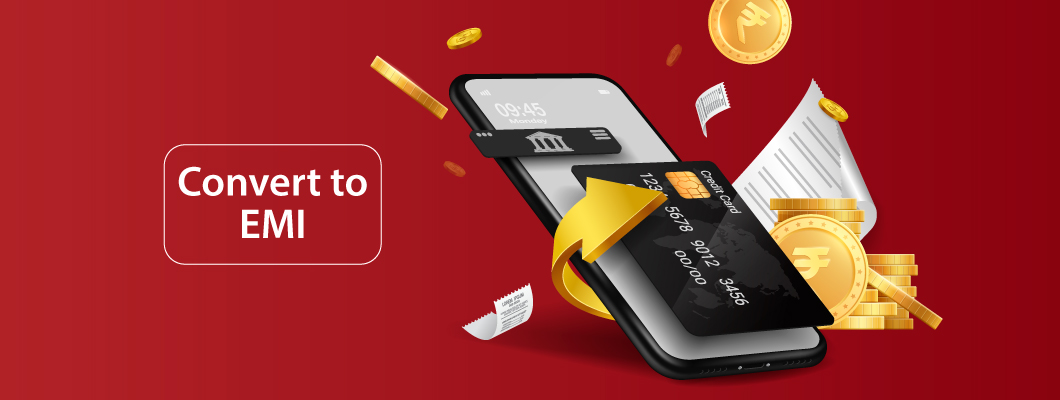
How to Convert Credit Card Transactions to EMI?
Posted on Monday, March 20th, 2023 | By IndusInd Bank
Credit cards have now become a popular payment method in the country, especially when it comes to making big ticket transactions. With the increased use of credit cards, many cardholders find themselves with a lot of debt that they may struggle to pay off. To help manage this, many credit cards now offer an option to convert credit card transactions into EMIs.
What is EMI?
EMI stands for Equated Monthly Installments. It is a payment option that allows a borrower to repay a loan or a credit card balance in instalments over a specific period. The EMI amount is calculated as the sum of the total principal amount borrowed and interest along with any other charges, divided by the number of months in the repayment period.
Converting credit card transactions to EMI
Converting credit card transactions to EMI is a simple process. As most credit cards offer this option to their cardholders, the very first step is to verify if your credit card issuer offers this option. You can usually find this information on the card issuer’s website or by calling the customer service.
If your credit card offers the option to convert transactions to EMI, you can follow these steps to convert your transactions to EMI:
Step 1: Identify Transactions
Identify the transactions that you want to convert into EMI. It is important to note that not all transactions may be eligible for conversion. Most credit card issuers have a minimum transaction amount for EMI conversion. Also, transactions made at certain merchant categories, such as fuel or insurance, may not be eligible for conversion.
Step 2: Check Eligibility
Check if the transactions you want to convert are eligible for EMI conversion. This can usually be checked online or by calling the customer service desk. It is important to note that converting transactions to EMI may attract a processing fee, although the interest rate charged may be lower than the interest rate on regular credit card purchases.
Step 3: Choose Repayment Tenure
Choose a repayment tenure that best suits your budget. Most credit cards offer different repayment tenure options ranging from 3 months to 24 months. The longer the repayment tenure, the lower the EMI amount, but higher the interest charged. Therefore, it is important to choose a repayment tenure that matches your financial ability.
Step 4: Confirm Conversion
Confirm the conversion of your transactions to EMI. This can also be done online or by calling the customer service desk of your credit card issuer. Once the conversion is confirmed, the transaction amount will be credited back to your credit card account, and the EMI amount will be debited from your account on the due date each month.
Advantages of Converting Credit Card Transactions to EMI
1. Budget management: Converting transactions to EMI allows you to manage your monthly budget effectively and plan your finances better.
2. Easy repayment: EMI repayments are usually automatic and hassle-free. The amount is deducted from your account on the due date each month, which means you do not have to worry about missing a payment.
3. Flexibility: Most credit card issuers offer flexible repayment tenures for EMI conversions. This means you can choose a repayment tenure that suits your budget and financial goals.
As now you know all about how you can convert your credit card transactions into EMIs, it is also important to note that you must thoroughly understand the related terms and conditions along with the EMI breakdown while converting your spends into EMI.
If you’re looking for a lifetime free credit card that offers unparallel benefits and offers, do checkout our range of exquisite credit cards. IndusInd Bank credit cards offer reward points that never expire and exclusive discount offers on top brands.
Disclaimer: The information provided in this article is generic in nature and for informational purposes only. It is not a substitute for specific advice in your own circumstances. Hence, you are advised to consult your financial advisor before making any financial decision. IndusInd Bank Limited (IBL) does not influence the views of the author in any way. IBL and the author shall not be responsible for any direct/indirect loss or liability incurred by the reader for taking any financial decisions based on the contents and information.



 Offers
Offers Rates
Rates Debit Card Related
Debit Card Related Credit Card Related
Credit Card Related Manage Mandate(s)
Manage Mandate(s) Get Mini Statement
Get Mini Statement
 categories
categories Bloggers
Bloggers Blog collection
Blog collection Press Release
Press Release


